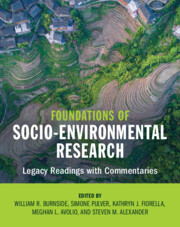Book contents
- Frontmatter
- Dedication
- Contents
- Contributors
- Foreword
- Acknowledgments
- Introduction
- Part I Early Classics of Socio-Environmental Research
- Part II The Roots of Socio-Environmental Research in Geography and Anthropology
- Part III Socio-Environmental Research in Economics, Sociology, and Political Science
- Part IV Socio-Environmental Research in Ecology
- Part V Ethical, Religious, and Historical Approaches to Socio-Environmental Research
- Part VI Technology, Energy, Materials, and Socio-Environmental Research
- Conclusion
Introduction
Foundations of Socio-Environmental Research
Published online by Cambridge University Press: 18 November 2022
- Frontmatter
- Dedication
- Contents
- Contributors
- Foreword
- Acknowledgments
- Introduction
- Part I Early Classics of Socio-Environmental Research
- Part II The Roots of Socio-Environmental Research in Geography and Anthropology
- Part III Socio-Environmental Research in Economics, Sociology, and Political Science
- Part IV Socio-Environmental Research in Ecology
- Part V Ethical, Religious, and Historical Approaches to Socio-Environmental Research
- Part VI Technology, Energy, Materials, and Socio-Environmental Research
- Conclusion
Summary
Research on society and environment has a rich history that is challenging to access. We define socio-environmental research as structured inquiry about the reciprocal relationships between society and environment. It has evolved from early observational expeditions to today’s data-intensive, interdisciplinary work. We assemble readings from the late 1700s to the mid-1990s to showcase this legacy and organize readings into chapters. Each chapter is introduced by a prominent scholar, who discusses the context key insights. Considered over time, readings suggest certain research themes have endured, forming lineages: a focus on populations and their resource bases, sustainable management of common-pool resources, society and land, technology, and systems. As a guide, this anthology can help new researchers gain a basic vocabulary and overview of different research traditions. Current researchers can learn different ways to conceptualize society–environment relationships, supporting interdisciplinary teams. For specialists in socio-environmental research, the readings can stimulate new questions and illuminate the historic nature of contemporary ideas and concerns.
Keywords
- Type
- Chapter
- Information
- Foundations of Socio-Environmental ResearchLegacy Readings with Commentaries, pp. 1 - 12Publisher: Cambridge University PressPrint publication year: 2022

